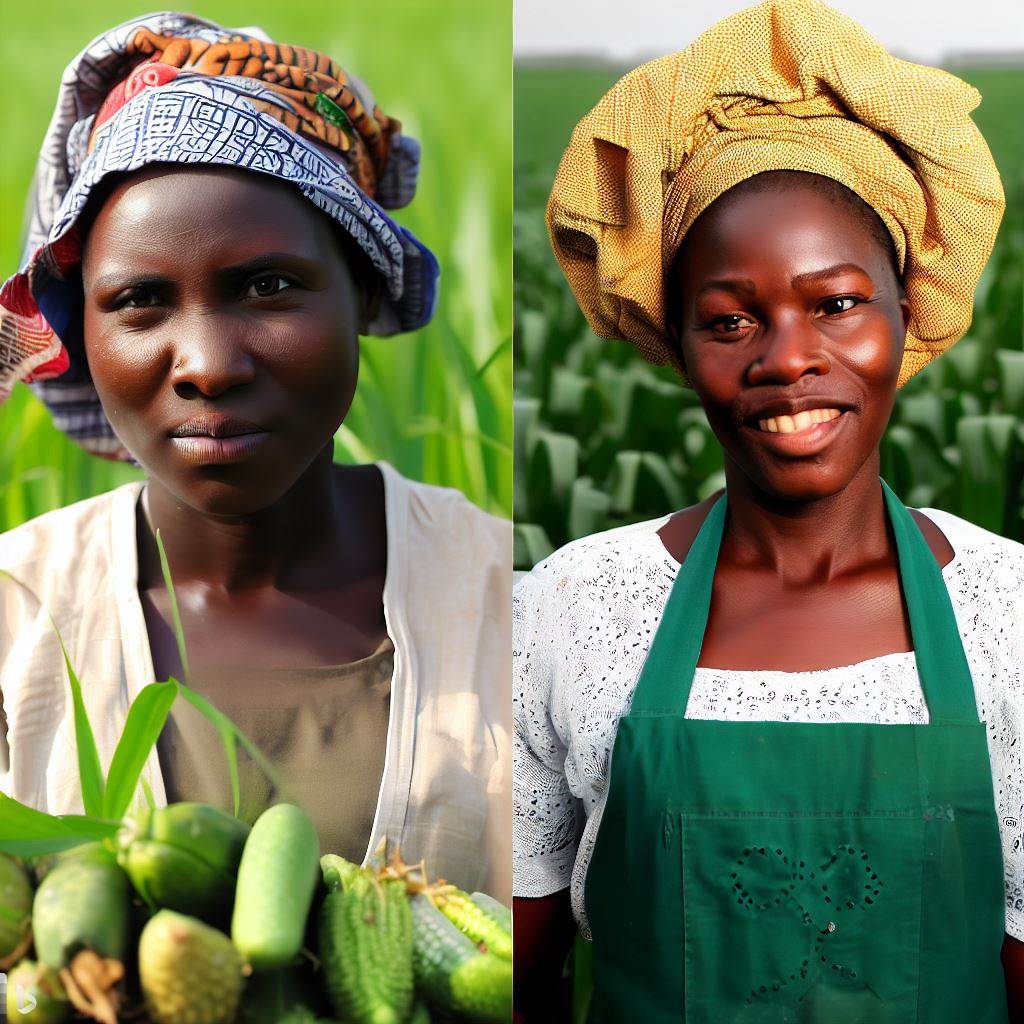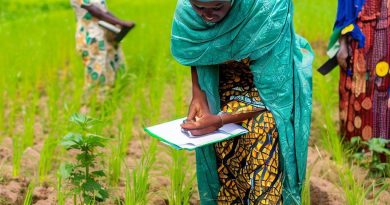The Impact of Farming on Nigeria’s Food Security
Last Updated on August 29, 2023
Introduction
The purpose of this blog post is to explore the impact of farming on Nigeria’s food security.
Nigeria’s farming sector plays a crucial role in the country’s economy and livelihoods.
Food security is vital for Nigeria’s population as it ensures access to sufficient and nutritious food.
Overview of Nigeria’s Agriculture Sector
A. Overview of Nigeria’s agricultural landscape
- Nigeria has a diverse agricultural landscape with favorable climatic conditions and rich natural resources.
- The country is blessed with fertile soil, abundant rainfall, and a wide range of agro-ecological zones.
- Nigeria’s agricultural sector consists of subsistence farming, commercial farming, and agribusiness.
- The main crops grown in Nigeria include cereals, vegetables, fruits, oilseeds, and cash crops like cocoa and rubber.
- Livestock farming is also prominent, with Nigeria being one of the largest producers of poultry and livestock products in Africa.
B. The importance of farming in the country’s economy
- Farming plays a crucial role in Nigeria’s economy, contributing significantly to the country’s GDP.
- Agriculture is the largest employer of labor, providing livelihoods for millions of Nigerians, particularly in rural areas.
- The sector contributes to rural development, poverty reduction, and food security in the country.
- Farming serves as a source of income for farmers and generates revenue through export of agricultural commodities.
- Nigeria relies heavily on farming for domestic food production, reducing the country’s reliance on food imports.
- The agricultural sector also serves as a platform for industrialization, with value addition and processing opportunities.
- Through farming, Nigeria can achieve sustainable development by promoting inclusive growth and addressing income inequality.
- Investment in agriculture enhances rural infrastructure, technology adoption, and creates opportunities for agricultural research and innovation.
- The sector has the potential to drive economic diversification and reduce dependence on oil revenue.
- Government policies and interventions, such as improved access to credit, agricultural extension services, and market linkages, have further facilitated the growth of farming in Nigeria.
Nigeria’s agricultural sector is of utmost importance to the country’s economy. The diverse agricultural landscape and favorable climatic conditions provide a conducive environment for farming.
With its significant contributions to employment, poverty reduction, food security, and revenue generation, farming plays a vital role in Nigeria’s development agenda.
Investment and government support in the sector are essential to harness its full potential and ensure sustainable growth.
Read: Career Spotlight: Veterinary Services in Nigeria
Nigerian Food Security Situation
A. The current state of food security in Nigeria
Nigeria’s food security situation remains precarious despite some improvements in recent years.
Multiple factors contribute to the persistent high levels of food insecurity in the country.
Although food production has increased, it has not kept up with the growing population.
Many Nigerians still face challenges in accessing sufficient and nutritious food.
Food insecurity is particularly prevalent in rural areas and among vulnerable populations, including children and women. Malnutrition rates are alarmingly high, further exacerbating the food security crisis.
B. The challenges faced in achieving food security
1. Climate change and its impact on agricultural production
Erratic rainfall patterns, droughts, and floods have negatively affected crop yields.
Unpredictable weather events make farming a risky endeavor, reducing food production.
Farmers need to adapt to climate-smart farming techniques and resilient crop varieties.
2. Limited access to modern farming techniques and technology
Many farmers in Nigeria still rely on outdated and traditional farming methods.
Lack of knowledge and training hinder the adoption of better farming practices.
Access to agricultural inputs such as improved seeds and fertilizers is limited for small-scale farmers.
3. Inadequate infrastructure for storage and transportation
Post-harvest losses are significant due to lack of proper storage facilities.
Poor transportation networks result in delays and spoilage of perishable agricultural produce.
Improving agricultural infrastructure is vital to minimize food losses and ensure supply chain efficiency.
The Role of Farming in Nigeria’s Food Security
A. Contribution of Farming to Food Security
Farming plays a critical role in ensuring food security in Nigeria. It provides a significant portion of the country’s food supply.
By cultivating crops and rearing livestock, farmers contribute to the availability of food. They produce staple crops like rice, maize, and cassava, which are essential for Nigerian diets.
Farming also supports the production of vegetables, fruits, and other nutritious foods. Without farming, there would be a scarcity of food, leading to insecurity and hunger.
Farmers’ efforts help in stabilizing food prices and preventing excessive inflation. Furthermore, farming promotes self-sufficiency by reducing dependency on food imports.
Local farming ensures that the population has access to a consistent and reliable food supply. It enables individuals and families to have regular meals, improving their overall well-being.
B. Farming’s Contribution to Domestic Food Consumption Needs
Farming plays a significant role in meeting Nigeria’s domestic food consumption needs.
The agricultural sector provides jobs for a substantial number of Nigerians, promoting economic growth.
By producing enough food locally, Nigeria reduces its reliance on imported goods. This reduces the strain on the country’s foreign exchange reserves and boosts the economy.
Food produced by local farmers is readily available and accessible to Nigerian consumers. Unlike imported food, locally produced items have shorter supply chains, ensuring freshness.
Additionally, farming offers a diverse range of food options for domestic consumption.
It supports the development of food processing and packaging industries, further enhancing food security.
Through sustainable farming practices, Nigeria can maintain a stable food supply for its population. Overall, farming helps in meeting the growing demand for food within Nigeria.
C. Potential for Export and Foreign Exchange Earnings Through Agriculture
Agriculture in Nigeria has immense potential for generating foreign exchange earnings.
The country’s vast arable land and favorable climate make it suitable for agricultural exports.
Exports of agricultural products can diversify Nigeria’s sources of foreign earnings.
By exporting surplus crops and produce, Nigeria can earn valuable foreign exchange.
Farming can be a significant contributor to reducing Nigeria’s trade deficit.
The cultivation of cash crops such as cocoa, palm oil, and rubber hold immense export potential.
Increased investments in agricultural value chains can harness this export potential.
Export opportunities also promote rural development and inclusive growth within Nigeria.
Foreign exchange earnings from agriculture will strengthen the country’s overall economic stability.
Therefore, the agriculture sector needs proper support and investment to maximize its export potential.
Farmers in Nigeria, through their dedication and hard work, contribute significantly to the country’s food security.
By cultivating staple crops, rearing livestock, and producing nutritious foods, they ensure a consistent supply of food for the population.
This contributes to the availability and affordability of food, stabilizing prices and preventing hunger.
In addition to meeting domestic food consumption needs, farming has enormous potential for export and foreign exchange earnings.
Nigeria’s vast arable land and favorable climate make it suitable for agriculture exports.
By capitalizing on this potential, Nigeria can reduce its dependence on imports, boost its economy, and improve its overall food security.
Investing in agricultural value chains and fostering exports will not only create foreign exchange but also drive rural development and inclusive growth within the country.
Therefore, the government and stakeholders must actively back and invest in the agriculture sector to unleash its complete potential and guarantee Nigeria’s long-term food security, considering the impact of farming on food security.
Read: An Overview: Agri-Marketing Jobs in Nigeria
Challenges Faced by Nigerian Farmers
A. The challenges faced by farmers in Nigeria
- Lack of access to credit and financing options.
- Insufficient government support and policies.
- Limited access to markets and price fluctuations.
B. The consequences of these challenges on food security
The challenges faced by Nigerian farmers have a significant impact on the country’s food security.
Let’s delve into each challenge and its consequences.
1. Lack of access to credit and financing options
One major challenge faced by farmers in Nigeria is the lack of access to credit and financing options.
Without sufficient funds, farmers struggle to purchase quality seeds, adequate fertilizers, and modern farming equipment.
This hampers their ability to increase productivity and meet the country’s growing demand for food.
The consequences of limited access to credit and financing options
- Reduced agricultural output: Farmers cannot invest in modern farming technologies and infrastructure, leading to lower productivity and yields.
- Food scarcity and increased prices: Insufficient agricultural output results in food shortages and drives up the prices of available food products.
- Poverty and unemployment: With limited financial resources, farmers cannot expand their operations or employ more workers, leading to increased poverty and unemployment rates.
2. Insufficient government support and policies
Nigerian farmers also face challenges due to insufficient support and policies from the government.
Inadequate agricultural extension services, poor infrastructure, and inconsistent policies negatively impact farmers’ productivity and income.
The consequences of insufficient government support and policies
- Low adoption of modern farming techniques: Without proper guidance and support, farmers struggle to adopt modern farming techniques that could improve their productivity.
- Lack of research and development: Insufficient funding for agricultural research inhibits innovation and limits the introduction of sustainable farming practices.
- Inefficient supply chains: Poor infrastructure makes it difficult for farmers to transport their produce to markets, resulting in significant post-harvest losses.
3. Limited access to markets and price fluctuations
Additionally, Nigerian farmers face challenges related to limited access to markets and price fluctuations.
Lack of proper transportation networks, storage facilities, and market information infrastructure hinder farmers’ ability to sell their produce at fair prices.
The consequences of limited access to markets and price fluctuations include
- Waste and spoilage: Without adequate storage facilities, farmers are unable to preserve their harvest, leading to substantial post-harvest losses.
- Income instability: Farmers’ incomes fluctuate due to unpredictable market prices, making it difficult for them to plan and invest in their farming activities.
- Dependency on intermediaries: Farmers often rely on middlemen and intermediaries who take advantage of their vulnerable position and offer low prices for their produce.
The limitations in credit and financing options that Nigerian farmers grapple with, the task of addressing inadequate government support and policies, and the navigation of restricted market access and price fluctuations, all actively contribute to the substantial impact of farming on the country’s food security.
Recognizing these challenges highlights the profound role that farming plays in shaping and safeguarding food security in Nigeria.
The government must actively tackle these challenges through focused interventions, which involve offering accessible credit, enhancing infrastructure, and enforcing steady policies.
By supporting and empowering farmers, the enhancement of food security is not only achieved but also drives the broader economic development of Nigeria.
The profound impact of farming on food security is evident in these efforts.
Read: Seed Production Careers: A Growth Sector in Nigeria

Initiatives to Improve Nigeria’s Food Security through Farming
A. Government initiatives to support farmers
- The Nigerian government has implemented various programs to strengthen the agricultural sector.
- One of these initiatives is the Anchor Borrowers’ Program, which provides loans to smallholder farmers.
- This program aims to increase agricultural productivity, create jobs, and reduce food imports.
- The government also launched the Presidential Fertilizer Initiative to enhance access to quality fertilizers.
- Through this initiative, fertilizer production has been revitalized, meeting the demands of Nigerian farmers.
- Furthermore, the government has established the National Livestock Transformation Plan to promote livestock production.
- This program focuses on improving animal health, productivity, and the welfare of pastoralists.
- These government initiatives play a crucial role in empowering farmers and ensuring food security in Nigeria.
B. The role of technology and innovation in enhancing farming practices
- Technology and innovation have revolutionized farming in Nigeria, making it more efficient and productive.
- One key example is the use of mobile apps and platforms that provide real-time information to farmers.
- These tools offer weather forecasts, market prices, and best practices, enabling farmers to make informed decisions.
- Additionally, precision agriculture techniques, such as GPS and drones, improve crop monitoring and yield estimation.
- Mechanized farming equipment, like tractors and harvesters, increases mechanization levels and boosts productivity.
- Innovation in irrigation systems, such as drip irrigation, reduces water wastage and enhances crop yield.
- The integration of biotechnology has led to the development of genetically modified crops with increased resistance to pests and diseases.
- Overall, technology and innovation have the potential to transform farming practices, ensuring sustainable food production in Nigeria.
C. Importance of agricultural research and development
- Agricultural research and development (R&D) is crucial for improving farming practices and ensuring food security.
- R&D helps discover new and improved crop varieties that are resistant to pests, diseases, and adverse climate conditions.
- It also facilitates the development of effective farming techniques and practices to optimize resource utilization.
- Agricultural research institutions play a significant role in disseminating knowledge and skills to farmers.
- They provide training programs, workshops, and seminars to enhance farmers’ capacity and expertise.
- Furthermore, R&D allows for the integration of traditional knowledge with modern techniques, fostering sustainable agriculture.
- Investments in agricultural R&D can lead to increased productivity, better market competitiveness, and improved livelihoods.
- Therefore, it is essential for the government and other stakeholders to support and prioritize agricultural research and development efforts.
Nigeria’s food security can be improved through various initiatives.
The government’s support to farmers, the role of technology and innovation in enhancing farming practices, and the importance of agricultural research and development are key factors.
These strategies contribute to increasing agricultural productivity, empowering farmers, and ensuring sustainable food production in Nigeria
Read: Farming Cooperatives in Nigeria: Job Opportunities
Success Stories and Case Studies
A. Success stories of farmers in Nigeria
- Peter Ekwueme, a small-scale farmer from Ondo State, successfully implemented sustainable farming practices.
- Despite facing challenges, Fatima Sani, a female farmer, tripled her crop yields by using modern techniques.
- Ibrahim Mohammed, a maize farmer in Kano State, improved his income by adopting mechanized farming methods.
B. Case studies of organizations making a positive impact on food security
- The International Institute of Tropical Agriculture (IITA) introduced improved seed varieties, resulting in increased yields for farmers.
- The Federal Ministry of Agriculture partnered with local cooperatives to provide affordable financing options to farmers.
- The Foodscape Farms initiative empowers urban farmers by providing training, resources, and market access.
These success stories and case studies demonstrate the significant impact farming can have on Nigeria’s food security.
By showcasing the achievements of individual farmers and initiatives, it becomes apparent that positive change is possible through various approaches.
Success Stories of Farmers in Nigeria
- Peter Ekwueme, a small-scale farmer from Ondo State, transformed his farming practices by incorporating sustainable techniques. He increased productivity while preserving the environment.
- Fatima Sani, a resilient female farmer, defied odds and harnessed modern farming techniques to achieve remarkable results. Despite limited resources, she managed to triple her crop yields.
- Ibrahim Mohammed, a maize farmer in Kano State, experienced a significant income boost through mechanized farming methods. His decision to embrace technology led to improved efficiency and increased profits.
Case Studies of Organizations Impacting Food Security
- The International Institute of Tropical Agriculture (IITA) conducted research and introduced improved seed varieties to Nigerian farmers. This intervention significantly increased crop yields and enhanced food security.
- The Federal Ministry of Agriculture partnered with local cooperatives to address the financial challenges faced by farmers. By providing affordable financing options, they empowered farmers to expand their operations and contribute to food security.
- The Foodscape Farms initiative has been instrumental in assisting urban farmers. Through comprehensive training programs, access to resources, and establishing market connections, this initiative supports sustainable urban agriculture.
These success stories and case studies illustrate the immense potential of farming in Nigeria and its impact on food security.
By showcasing the achievements of both individual farmers and collaborative efforts, it emphasizes the importance of innovation, knowledge sharing, and collective action.
Through these success stories, aspiring farmers can find inspiration and practical examples of how they can improve their own practices.
Furthermore, organizations, policymakers, and stakeholders can draw lessons from these case studies to design and implement effective strategies.
Nigeria’s food security can be transformed by acknowledging and learning from success stories within the agricultural sector.
By highlighting the achievements of farmers and organizations, we encourage others to adopt sustainable practices, embrace technological advancements, and collaborate for a prosperous future in farming.
Conclusion
In this blog post, we discussed the impact of farming on Nigeria’s food security, highlighting several key points.
Farming plays a crucial role in ensuring food security in Nigeria, providing employment opportunities and a stable food supply.
To further improve the sector, it is important for the government to prioritize agricultural development, invest in infrastructure, and provide necessary support to farmers.
Additionally, promoting sustainable farming practices, implementing effective policies, and encouraging research and innovation can contribute to long-term food security in Nigeria.
It is vital for all stakeholders, including farmers, policymakers, and consumers, to recognize the significance of farming and work together to achieve a resilient and sustainable food system.
By doing so, Nigeria can overcome the challenges it faces in ensuring adequate food supply and create a future where no one goes hungry.
Let us all take action now and support initiatives that strengthen farming in Nigeria, ensuring a prosperous and food-secure nation for generations to come.


